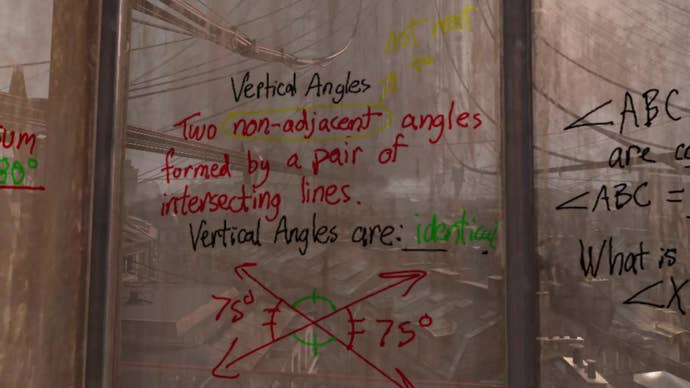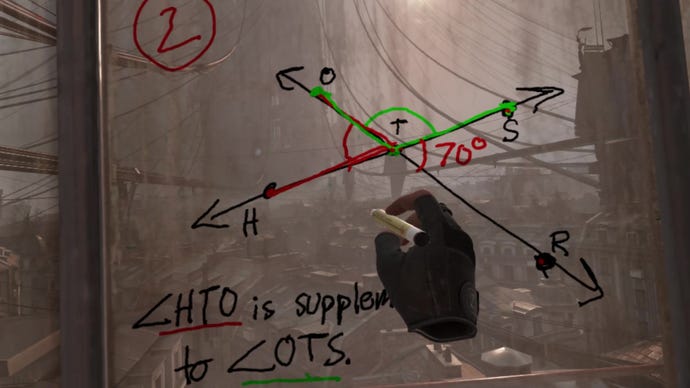Meet the Teacher Who Turned Half-Life: Alyx Into a VR Classroom Amid the Coronavirus Lockdown
This 7th grade teacher, now stuck teaching online, has found a way to spice up his lesson plan with a trip to City 17.
This article first appeared on USgamer, a partner publication of VG247. Some content, such as this article, has been migrated to VG247 for posterity after USgamer's closure - but it has not been edited or further vetted by the VG247 team.
Charles Coomber is a virtual reality advocate, a big Half-Life fan, and a very responsible teacher. He teaches multiple subjects at Otay Ranch Academy for the Arts, a Chula Vista, California middle school in the Springs Charter School network. Every weekday, for a class of 32 students, Coomber covers everything from world history to art instruction.
Coomber still teaches his 32 students every day, but now he's doing it remotely. Earlier this month, as California enacted a strict statewide stay-at-home order in response to the COVID-19 coronavirus outbreak, teachers across the state took home their computers and prepared to rework their lesson plans. Along with his computer, Coomber took home his classroom's Oculus virtual reality headset.
Last week, shortly after the release of Valve's highly anticipated VR exclusive Half-Life: Alyx, a video Coomber recorded for his students in-game went viral. Using functional whiteboard markers in Half-Life: Alyx's opening area—used by many others to draw Simpsons characters or more obscene doodles—Coomber put up an entire math lesson on angle vocabulary, complete with pristine diagrams.
 Let's Play: Angle Vocabulary Review (in Half Life: Alyx) - Supplementary, Vertical and Complementary
Let's Play: Angle Vocabulary Review (in Half Life: Alyx) - Supplementary, Vertical and Complementary
USgamer spoke with Coomber last week about his love for Half-Life, how his VR lesson came about, and what it's been like for himself and other teachers during the pandemic.
USgamer: Did you buy a headset for Half-Life: Alyx, or have you been into VR for a while?
Charles Coomber: I mean, I'm part of the gaming generation that all played Half-Life and Half-Life 2, and then we've been waiting a decade, or however long it's been, for Half-Life 3 to come out. When Half-Life: Alyx was announced, a lot of gaming people were like "Aw, no, I hate this." I was like "yeah!"
I've been a very forward adopter of VR. I have three VR headsets right now, all Oculus. I have the original Oculus, and now I have a Rift S and the Quest. I love it. It's so immersive. When I'm in it, it feels like I'm gaming in the future I always imagined I would as a kid.
Are you using the Rift S and Oculus Touch controllers in the video of the lesson?
Yeah! I made that video, really, because I had to teach [the day Alyx came out], but I really wanted to play. So I played just a little bit, and thought, "It would be hilarious to film a video here, my kids would love it."
People have been marveling at your impeccable VR board handwriting.
Which is amazing, because in real life, y'know—if you go into an elementary school class, you're like "the boards are all so beautiful." My writing is not. They'll figure it out, they're in middle school.
I definitely was being really careful. Some of the lines are so smooth that I think, "That's more straight than I can do in real life." I do think the game has [an assist].
What's your regular class load like? Where would this angle vocabulary lesson fall in the course of a normal week of teaching?
I teach seventh grade right now, and I teach multiple subjects. So, similar to a traditional fifth grade class where you teach the same kids all day and you teach every single subject. When we're not under coronavirus lockdown, I teach live with my 32 kids, and I actually keep my Oculus Rift S at school.
I almost always have a student in VR, unless we're taking a test. We use it for a few different things. First, as an incentive: there's this kind of boring math program that the kids have to do to up their math skills, so I say "every time you get five percent on that, I'll give you five minutes in VR." Kids will save up their passes, cash in 30 minutes at once, then play Beat Saber for half an hour.
There's a lot of good immersive history simulations and history games in VR right now, so we'll use it for that, and for a lot of art projects we do them inside of VR. They're so mind blowing to the kids. Their parents will come into exhibitions where we show off the art, and they always go, "Wow, this is something everyone wishes they had when they were growing up."
Your video lesson came about not just because of Half-Life: Alyx, but because of the coronavirus pandemic. What was the transition to teaching remotely from your home like?
It's actually such a cool arc. It just happened on a Friday. Even earlier that week, we got an email saying, "No, everything's going to be as usual, we're just going to continue with normal classes." Then, throughout the course of a single Friday, a bunch of school districts shut down.
We had a meeting after school: "So, it looks like we're not going to have students here anymore, but we're still going to be teaching full-time." It was really lucky for us, or for my job at the moment, because we're kind of a hybrid homeschool and in-class school. Students work from home every single Monday, even in normal times. All the teachers were really used to creating five hours of home study for those Mondays, so they basically said, "Whatever you do on Mondays, you just have to expand it to include the rest of the week."
After a week of that, on [March 19], Governor Gavin Newsom said, "Shut it down; California's on real lockdown now." The [charter administrators] said, "If you need anything from school, grab it tonight." [...] All these teachers came to school at 8 p.m. and were taking home all their computers. It was like extreme looting. Everyone was saying things like "Did you get whiteboard markers, you're going to need a whiteboard," or "Oh, Clorox wipes, I should definitely take these home." It was such a surreal moment. It's the safest version, I guess, of an evacuation.

So you're in a good position to handle this, but do you know anyone who is in a more typical public school scenario who has approached you or your peers for help?
Yeah, I have live Zoom meetings with all my kids, and it's actually really nice. The best part of teaching live, [rather than] if I pre-recorded five hours of lessons and said, "Go watch it," is that they still have that community and a role model. We're really tight, since I do teach the same 30 kids all day. I assume most kids have a more personal relationship with, say, their third grade teacher than they would with a normal middle school where you see five teachers a day. I'd say it was the best teaching situation to be in, because the conversion from teaching at the site to teaching at home was pretty easy. Not only were the teachers prepared, but the students were prepared.
A lot of school systems right now, to my understanding, have done nothing. It's extended spring break, and they're slowly ramping up. I have family friends who have said, "I noticed you're still teaching, and my kid's just sitting at home not learning, can you just send him a copy of the work?" And I say yeah, that's okay. [Editor's Note: Springs Charter Schools is also offering free online public education courses for grades K-8 during the pandemic].
Do you have any key advice you'd pass along to other teachers who have struggled to adapt to this?
One, any age can do it. At my school, we have kids as young as pre-kindergarten, literally doing this, mostly with parents helping. As a middle school teacher I'm fortunate since my kids are more tech-savvy.
There's a lot of really good programs out there that make things easy, you don't need to reinvent things. If you think, "Man, I wish there was some way to do this thing," it probably already exists, because a lot of other schools [have done it]. Also, a lot of educational organizations are making their premium stuff free during this pandemic.
How could people go about supporting your class or other teachers' classrooms at this time? What's the government doing to help, and what do you think it should be doing?
I absolutely agree that teachers need to be paid more—and not just paying teachers, but funding schools. I feel like I'm pretty talented and smart, but I have friends who are more talented who don't even consider teaching in the first place, who go, "You can't support a family easily on that [salary]." Some people I met in my teaching program have left prematurely, I would say, because there's so many other alternatives that draw smart individuals that need more money.
If random individuals want to support us, DonorsChoose is really good. The reason I'm able to do this isn't that I have so much teacher money to buy fun toys for my classroom. I use DonorsChoose a lot—this is my fifth year teaching now, and I keep asking for more and more things. The community around me has been so gracious. It's not just people, corporations sometimes will do it.
It makes such a difference. It's such a direct impact on my students. My karaoke mic is a good example: that one purchase cost the public, I guess, and some of my friends and family, $150. It's been amazing, with Karaoke club at lunch, these middle schoolers who are so shy and cliquey, end up becoming like Glee club. It's fun and teambuilding.
So, this is a very minor Half-Life: Alyx spoiler, but there's at least one other place with whiteboard markers you could record in. Any chance of another lesson from City 17?
I might do one more just for the sake of it! It's not the most efficient teaching system, but I think that my students would really enjoy me doing one more. I don't want this to be my gimmick, though; middle schoolers have a short attention span, as I'm sure the regular public does.
Is there anything you hope that Valve or another company involved in VR could learn about the tech's role in a classroom?
I think there's an incredible market for a really solid program or game that could do immersive teaching that would run on Quests. Right now, [a lot of] schools can afford Chromebooks. I envision, I think in the near future, that there could be some decent, MMORPG-style thing with whiteboards where you can also teleport to a mountain when you learn about ecology. It can be transformative to education.
Even now, with my hybrid school, the kids are not getting quite as solid an education as they do in-person, I think. With even current levels of technology, I think that program could be pulled off if some triple-A company would make that. You can see the potential with VR already, more than just being a whiteboard simulator.
This interview has been lightly edited for length and clarity.

